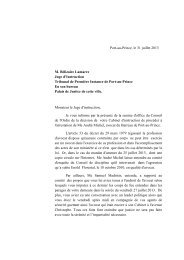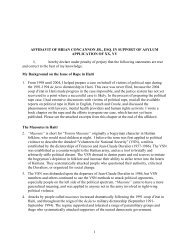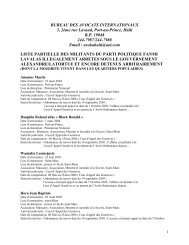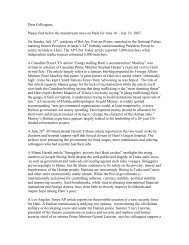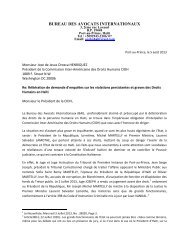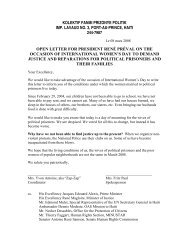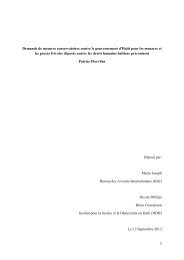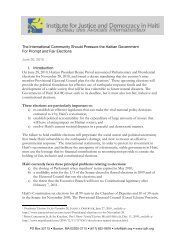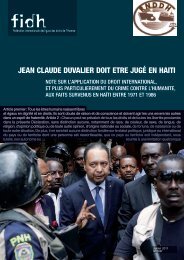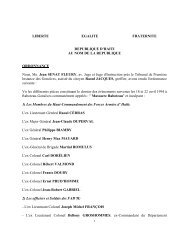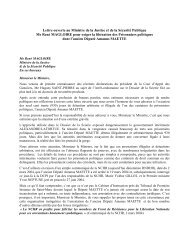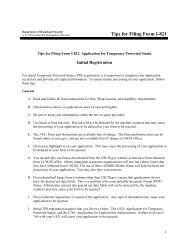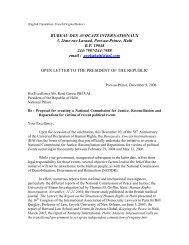Peacekeeping without Accountability - Yale Law School
Peacekeeping without Accountability - Yale Law School
Peacekeeping without Accountability - Yale Law School
- No tags were found...
You also want an ePaper? Increase the reach of your titles
YUMPU automatically turns print PDFs into web optimized ePapers that Google loves.
A. Humanitarian Organizations HaveDeveloped Principles and Standardsof Aid, Which U.N. Agencies HavePromoted, to Address the UnintendedHarms That Often Arise fromRelief Work.Humanitarian relief principles address theobligations of organizations delivering aid inconflict and emergency settings. These principlesstem from over a century of experience on the partof humanitarian actors in conflict settings andin complex humanitarian emergencies. Since thelate 19th century, independent but authoritativeorganizations like the ICRC have articulated thesehumanitarian principles, many of which havebeen codified in international law. These principleslimit how combatants may fight in war and governthe treatment of civilians, including requiringrespect for their health and security needs. Duringthe latter half of the 20th century, this focus onhumanitarian principles expanded to encompassthe obligations of relief organizations working inconflict and emergency situations. 274Humanitarian NGOs increasingly have soughtto develop frameworks that address both thecauses of unintended harmful consequences ofrelief and the lack of accountability humanitarianorganizations otherwise have to populationsreceiving assistance. 275 These frameworks not onlyestablish a broad principle of do no harm; they alsoprescribe a standard of professionalism againstwhich actions causing harm can be measured.Humanitarian actors are not responsible for everyharm caused by their presence; rather, they areaccountable only when their actions fall belowan accepted standard of professionalism. Finally,these principles hold accountability as a coreprinciple, and some set up specific processes toensure such accountability.Three humanitarian aid frameworks havebeen particularly influential: the ICRC Code ofConduct, the Sphere Project Humanitarian Charterand Minimum Standards, and the Humanitarian<strong>Accountability</strong> Partnership (HAP) Standard. TheICRC Code, Sphere Standards, and HAP Standardplay an important regulatory role in the field ofhumanitarian relief work. All three frameworksshare a common humanitarian goal of respectinghuman dignity 276 , which in turn entails acommitment to the do no harm principle and toimprovement in the quality of aid delivered. 277All three frameworks also reflect the belief thatproviding humanitarian relief requires meetingcertain minimum criteria of acceptable aid. Anumber of other humanitarian actors, includingU.N. agencies, have adopted and promoted the dono harm and accountability principles underlyingall three frameworks. 278The ICRC Code of Conduct is one of the firstcodifications by the international communityof humanitarian principles of relief response. 279Published in 1994, the ICRC Code is one partof a long history concerning the role of nongovernmentalactors in conflict and emergencysettings. This history dates back to at least as earlyas the ICRC’s founding in 1863 and is informedby over a century of successes and shortcomingsin humanitarian relief efforts. 280 The ICRC Codelays out broad principles of responsibility fororganizations delivering aid. Among these arean obligation to protect local populations—orat minimum, to do no harm to them—anda commitment to establish mechanisms ofaccountability for these populations. 281 Despitedebates about the effectiveness of the ICRCCode, today over 500 non-governmental relieforganizations are signatories to the ICRC Code andagree to abide by these principles. 282The principles articulated in the ICRCCode of Conduct are foundational to standardsof humanitarian aid developed by the SphereProject. 283 In 1996, a loose coalition of humanitarianNGOs, funders, and other actors, including theICRC, sought to develop minimum standardsof aid delivery from more general principles ofhumanitarian relief response. These actors weremotivated in part by the perceived failures of thehumanitarian NGO community in the Rwandangenocide and the Great Lakes refugee crisis of theearly 1990s. 284 In 1996, key humanitarian actorsbegan wide-ranging consultations with otherNGOs and international organizations, includingU.N. agencies, and ultimately created the SphereProject. 285The Sphere Project generated the Sphere45the u.n.’s actions violated principles and standards of humanitarian relief



